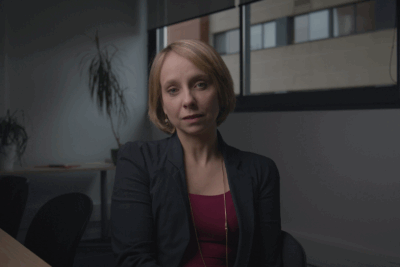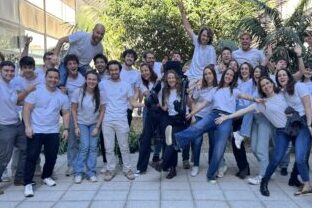20th May 2025
EIT Health has selected seventeen start-ups to go through the Deep Tech Venture Builder (DTVB) Programme, a unique programme aimed at innovators in academia.
Specifically designed to support academic teams with deep tech solutions, EIT Health’s DTVB provides start-ups with the right support to overcome the most frequent hurdles experienced when launching to market. Notoriously known as the “Valley of Death” – where many promising ideas fail to transition out of academic environments – successfully navigating this stage requires overcoming the most common challenges such as bureaucratic hurdles, funding uncertainties, and making the transition from research to practical innovation.
The 17 projects that will be supported by EIT Health DTVB Programme are:
- 4xSleep (Switzerland) is designing a mattress system with active firmness and temperature control to personalise and improve sleep quality;
- ACCREMeter (Poland) is developing a handheld device for real-time creatinine measurement, empowering hemodialysis patients with personalised care;
- COMRADE (Poland) is implementing AI to assist doctors during colonoscopies, enhancing early detection rates of colorectal cancer;
- DIABYUDA (Spain) is developing an AI-powered clinical support platform to personalise treatment for type 2 diabetes and comorbidities;
- Dynatract (Spain) is developing a traction system to safely close open abdomens, reducing complications and ICU stays in critical surgeries;
- EggSense (France) is creating a non-invasive technology to assess oocyte maturity, optimising selection in assisted reproductive procedures;
- EMCare (Spain) is detecting early progression in Multiple Sclerosis patients through a smartphone app that passively monitors tapping speed;
- ErectLife (North Macedonia) is developing an AI-powered mobile app offering personalised, discreet support for men managing erectile dysfunction;
- GlycoView (Italy) is introducing a non-invasive MRI method to detect glycolysis deregulation, aiding in the diagnosis of cancer and neurological disorders;
- My-Uvec (Spain)is designing a device that measures children’s outdoor light exposure to assess and prevent the progression of myopia;
- NIBITIC (Poland) is creating a portable biosensor for rapid, at-home detection of inflammation and cancer markers, enhancing patient monitoring;
- PAL-HAND (Italy) is designing a pneumatic handheld device providing haptic feedback to enhance upper limb neurorehabilitation;
- PICASSO (France)is creating an AI-based tool to analyse immune systems, aiding in personalised immunotherapy and biomanufacturing quality control;
- PINCH (UK) is developing a clinical tool that interprets brain and heart signals to objectively measure pain in young children;
- Protonshot (Netherlands) aims to double patient throughput in proton therapy by reducing positioning time from 40 to under 3 minutes, expanding access to precision cancer treatment;
- SHAIPE (Austria) is using AI to automate 3D cell shape analysis for faster, more accurate disease detection and patient stratification, especially in neurological disorders;
- Telendo (France) is implementing software that creates dynamic digital representations of organs during endoscopy for improved diagnostics.
“During 2023 and 2024 we conducted several focus groups, workshops and interviews with more than 100 key stakeholders in the healthcare ecosystem at a European level and the insights gathered helped shape this programme. Now the DTVB programme is a reality, and we are excited to see it come to life with such innovative and promising projects. We are thrilled to witness the journey of these innovative projects and the transformative impact they will have on the healthcare landscape,” says Maria Escarti, DTVB Programme Lead at EIT Health.
More about the selected projects
During the DTVB programme the selected consortia will work to transform their deep tech academic research into successful ventures by bridging the gap between intellectual property and start-up creation. They will be provided hands-on support to help de-risk early-stage innovations and guided through both pre-maturation and maturation phases.
4xSleep
Country: Switzerland | Participating organisations: University of St. Gallen, Switzerland Innovation Park Ost
4xSleep is pioneering the world’s first mattress system that combines active firmness control with temperature regulation to deliver fully personalised sleep. Designed to support spinal alignment, reduce time to fall asleep, and enhance rest, it adapts to each user’s unique needs, benefiting everyone, from individuals with back pain to couples with different comfort preferences. With support from the DTVB programme, 4xSleep will validate its innovation and move toward market launch, setting a new standard in sleep health and recovery, by gaining access to seasoned HealthTech founders and other strategic partners.
ACCREMeter: ACcurate CREatinine Meter for hemodialysed patients
Country: Poland | Participating organisations: University of Warsaw, Commercialization Reactor
This project is revolutionising kidney care with a handheld device that provides real-time, lab-grade creatinine measurements, unaffected by bilirubin interference. It empowers hemodialysis patients with accurate, on-the-spot data to personalise treatment, reduce unnecessary sessions, and improve quality of life. With support from the DTVB programme, the team will gain expert guidance, technical resources, and access to strategic partnerships to advance toward clinical validation and a future wearable solution.
COMRADE: AI-powered assistant for real-time colon cancer screening
Country: Poland | Participating organisations: Medical University of Lodz, The Heart sp. z o.o.
COMRADE is an AI-powered system developed at the Medical University of Łódź to support doctors in detecting early signs of colorectal cancer during endoscopy. Colorectal cancer is one of Europe’s deadliest yet often late-diagnosed cancers, so by integrating seamlessly with existing hospital equipment, COMRADE enhances accuracy without costly upgrades. Funding, mentoring, and industry connections from the DTVB programme will help bring COMRADE to hospitals and significantly improve cancer care across Europe.
DIABYUDA: Clinical decision support system for type 2 diabetes and comorbidities
Country: Spain | Participating organisations: Fundación Miguel Servet, Hospital Universitario de Navarra, Incubadora Universidad de Navarra, Clinica Universidad de Navarra
DIABYUDA is a digital platform designed to support healthcare professionals in managing type 2 diabetes by delivering personalised, evidence-based treatment plans. By combining artificial intelligence with real-world clinical data, it helps optimise medication choices and lifestyle recommendations. The project aims to improve patient outcomes, reduce complications, and ease the burden on healthcare systems. Through the DTVB programme, DIABYUDA will receive expert support to navigate clinical validation, regulatory requirements, and scalable implementation.
Dynatract: Dynamic abdominal wall traction system for open abdomen
Country: Spain | Participating organisations: IDIVAL, Fundación Botín
Dynatract is a novel medical device designed to improve outcomes for patients undergoing open abdomen surgery – a high-risk procedure often needed in trauma or severe infections. Its innovative traction system supports safer abdominal closure, helps to reduce complications, and shorten intensive care unit stays. With help from the DTVB programme, the team will advance toward clinical trials and regulatory approval, aiming to transform care for some of the most vulnerable patients.
EggSense
Country: France | Participating organisations: Institut FEMTO-ST, SUPMICROTECH-ENSMM, Université Marie et Louis Pasteur (UMLP), CNRS, SATT SAYENS, iBionext
EggSense is a non-invasive technology designed to improve the success rate of medically assisted procreation by objectively assessing oocyte maturity based on mechanical properties, moving beyond today’s subjective visual selection methods. Integrated into existing Intracytoplasmic Sperm Injection (ICSI) workstations, EggSense enhances oocyte selection to boost fertilisation outcomes. Through the DTVB programme, the team will access expert mentorship, financial resources, and a network of healthcare innovators to accelerate development, refine automation, and bring this breakthrough to the field of reproductive medicine.
EMCare: Effortles Multiple sclerosis Care through remote evaluation
Country: Spain | Participating organisations: Fundación para la Investigación Biomédica del Hospital, Universitario Ramon y Cajal, Genesis Biomed, Solvium Consulting Group
EMCare is a smartphone app that passively tracks tapping speed on patients’ mobile phones to detect early signs of progression in Multiple Sclerosis, specifically targeting the often-overlooked PIRA form. Unlike traditional tools, it runs in the background, enabling earlier intervention without burdening patients or clinicians. With the DTVB programme support, EMCare will receive critical support in product development, regulatory strategy, and access to funding opportunities. This will help accelerate the intervention from pilot to certified medical device.
ErectLife: Reinventing men’s sexual health with AI
Country: North Macedonia | Participating organisations: Ss. Cyril and Methodius University of Skopje, LC Innoconsult
ErectLife is an AI-powered mobile app tackling the widespread issue of erectile dysfunction (ED) by offering discreet, personalised, and evidence-based support. It combines treatment recommendations, lifestyle guidance, symptom tracking, and teleconsultations within a secure, GDPR-compliant platform, empowering men to manage ED holistically and privately. Through the DTVB programme, the team will gain expert mentorship, funding, and access to healthcare networks to navigate regulatory hurdles and bring this innovative digital health solution to market faster.
GlycoView: Endogenous MRI method for imaging glycolysis deregulation
Country: Italy | Participating organisations: University of Turin, Polytechnic of Turin
GlycoView is an innovative MRI-based imaging technology that detects glycolysis deregulation – a key marker in diseases like cancer and neurodegeneration – without the need for injected contrast agents. By amplifying signals from natural metabolites, it offers a safer, more accessible imaging option for vulnerable patients. The DTVB programme will be instrumental by providing access to clinical networks, regulatory expertise, and technical validation pathways. GlycoView aims to validate its clinical use, and streamline regulatory approval, paving the way for more sustainable, cost-effective metabolic imaging in everyday healthcare.
My-Uvec: Tackling the global rise of childhood myopia
Country: Spain | Participating organisations: University of Navarra, Incubadora Universidad de Navarra
My-Uvec is a breakthrough device designed to combat the global rise of childhood myopia by measuring CUVAF, a unique biomarker that reflects a child’s exposure to outdoor light, a key factor in slowing myopia progression. This non-invasive tool combines quick imaging with AI-driven analysis to provide eye care professionals with personalised, preventive insights. With support from the DTVB programme, My-Uvec will validate its clinical accuracy, integrate into everyday practice, and move toward market readiness, empowering families to protect children’s vision and reduce long-term eye health risks.
NIBITIC: Nano-Based IL-6, IL-8, and TNFα Biosensor for Inflammatory and Cancer Biomarkers
Country: Poland | Participating organisations: University of Zielona Góra, The Heart
NIBITIC is a portable biosensor that empowers cancer survivors with fast, lab-free detection of key inflammation and cancer markers (IL-6, IL-8, TNFα) in just one hour. This user-friendly device brings hospital-grade diagnostics to homes and clinics, enabling earlier interventions and greater peace of mind. With support from the DTVB programme, the team is gaining expert mentoring and strategic resources to overcome the hurdles that come with turning a lab prototype into a certified medical product – paving the way for more accessible, proactive healthcare starting in oncology and extending across chronic disease management.
PAL-HAND: Pneumatic And Lightweight HANdheld device
Country: Italy | Participating organisations: Politecnico di Torino, Commercialization Reactor
PAL-HAND is an innovative handheld device designed for upper limb neurorehabilitation, using pneumatic force, vibrotactile, and audio feedback to deliver an engaging, multimodal therapy experience. By enabling tele-rehabilitation, it supports clinicians, enhances patient motivation, and allows objective tracking of recovery, ultimately reducing healthcare costs. With support from the DTVB programme, the team is advancing toward commercialisation by collaborating venture builder Commercialization Reactor to connect with rehabilitation and industry experts.
PICASSO
Country: France | Participating organisations: Institut Pasteur, iBionext
PICASSO is an AI-powered tool that unlocks deeper insights into patients’ immune systems, helping clinicians personalise treatments like CAR-T therapy and enabling biomanufacturers to improve immune cell screening and quality control. By streamlining complex cell analysis, PICASSO supports more effective, tailored immunotherapies. Through the DTVB programme, the team is gaining essential business, regulatory, and market expertise looking to transform scientific innovation into a high-impact venture at the forefront of personalised medicine and biomanufacturing.
PINCH: An initiative to measure pain in all children using brain and heart signals
Country: UK | Participating organisations: University of Oxford, Ship2B Ventures (Montana Impact Fund)
Millions of hospitalised children suffer pain that often goes untreated due to the lack of reliable measurement tools – especially for babies and toddlers. A team at the University of Oxford, led by Prof Rebeccah Slater, has developed a groundbreaking clinical tool that uses brain and heart signals to objectively measure pain in young children. Through the DTVB programme and support from Ship2B Ventures, the team is transforming decades of research into a real-world solution. Dedicated EIT Health funding and training will turn this pain measurement technology into a practical solution to prevent childhood pain.
Protonshot
Country: Netherlands | Participating organisations: University Medical Center Groningen; Founded
Using advanced mathematics and AI, Protonshot aims to double patient throughput, cut costs, and make life-saving proton therapy cancer treatment more accessible by reducing patient positioning time from 15+ minutes to under 3 minutes – without sacrificing precision. With the support of the DTVB programme, the ProtonShot team will receive expert guidance in regulatory compliance, business development, and start-up formation.
SHAIPE: Segmentation of High-dimensional data using AI for Precise Evaluation
Country: Austria | Participating organisations: Institute of Science and Technology Austria (ISTA), xista
With their AI- based algorithm trAIce, this project revolutionises how cell shape, a key biomarker in disease progression, is detected and analysed in 3D. Unlike current methods that rely on time-consuming, error-prone manual work, trAIce delivers fast, accurate, and automated analysis, unlocking earlier diagnosis and better patient stratification, especially in neurological diseases. Through the DTVB programme, the team will access expert guidance, technical resources, and a collaborative innovation environment that will help translate their prototype into a robust, scalable product.
Telendo
Country: France | Participating organisations: Laboratoire CRAN (Université de Lorraine, CNRS), SATT SAYENS, Factory 319
Telendo is set to transform gastrointestinal endoscopy with its innovative digital representations of the upper digestive tract. Addressing a critical healthcare need, our technology improves diagnosis quality, enabling accurate disease monitoring and virtual re-examinations for esophageal and gastric cancers. Using patented mosaic technology, Telendo overcomes video streaming limitations, providing extended fields of view and enhanced documentation. With support from the DTVB programme, Telendo is gaining the structure, expertise, and access to European innovation ecosystems needed to reach key milestones and drive a new era of data-driven diagnostic workflows and patient care efficiency.
Impact of EIT Health programmes
Since its inception, EIT Health has supported over 2,998 start-ups and scale-ups, trained more than 65,000 students and professionals, and facilitated the launch of 123 products and services addressing unmet health needs. In 2023 alone, EIT Health’s initiatives directly benefited over 140,000 citizens and patients, with supported start-ups attracting €284 million in investment.
EIT Health offers a range of programmes tailored to various stages of innovation, from ideation to market entry. Whether you’re a student, researcher, or entrepreneur, there are opportunities to gain support, mentorship, and funding.
Discover more about EIT Health’s programmes and how you can get involved.
EIT Health and the EDIT-B consortium transform bipolar disorder diagnosis with groundbreaking blood test

Discover this life-changing project today.
Three EIT Health innovators nominated for EIT Awards

Meet our three EIT Award nominees.
Hospital Clínic study reinforces patient participation as key to digital health innovation

New work published in Journal of Medical Internet Research.